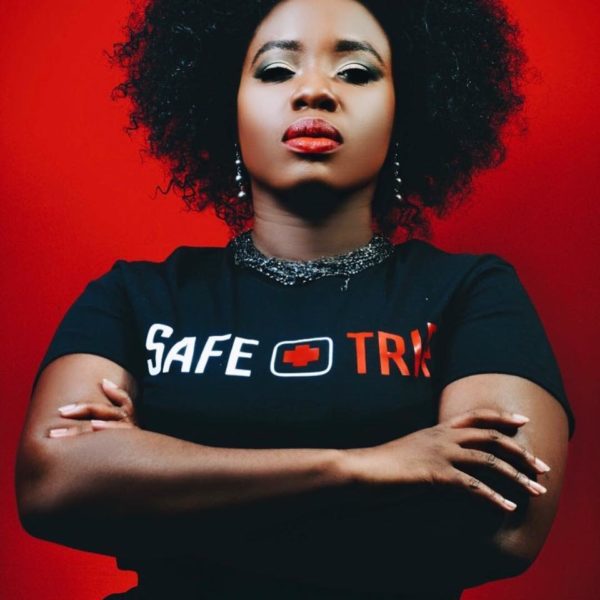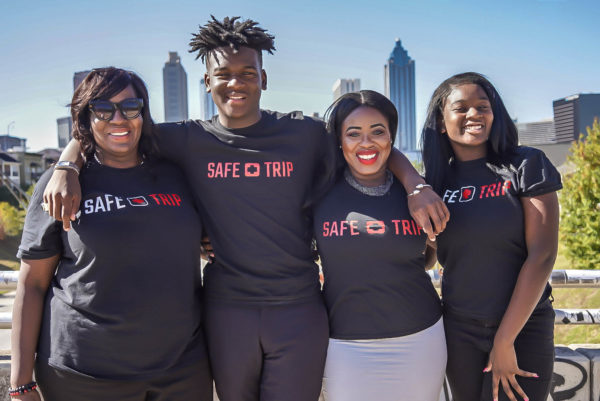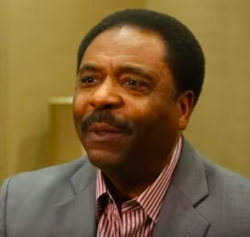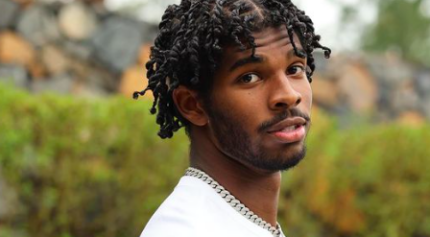When a homeless veteran walked up to opera singer Ja’Nese Jean in Atlanta’s Hurt Park, she didn’t expect him to complain.
Jean was serving barbecue and sweets at a volunteering event to feed the homeless.
“It sounded ungrateful,” Jean told Atlanta Black Star.

Still, she listened to the man, who told her she was serving the wrong kind of food.
A lot of homeless people don’t have access to fruit, water or medical care, he told her.
Jean said at that moment she had an “ah-ha” moment, and later that night, she dreamed about the man she spoke with.
“I saw in my dream us transporting him to the hospital,” Jean said.
That dream led her to develop SAFETRIP, an app that provides people with affordable transportation to get medical care.
The company grossed $3.4 million in 2018.
“I think we’ll get there,” she said.
The business works similarly to other ride-sharing companies in that a user can simply download the app, select a type of vehicle and request a ride.
The type of ride, however is what set SAFETRIP apart when it was developed in 2017.
Users can request wheel-chair accessible vehicles and ambulances, and drivers undergo background checks, CPR training, defensive driver training and sensitivity training instructing them to open doors for clients, play appropriate music and offer to wait until client appointments are over.
“A ride isn’t over until it’s over,” Jean said. “So we don’t just go and drop a client off.”
The company also doesn’t make drivers or users foot the bill for time spent waiting for the appointment to end. Jean said SAFETRIP absorbs that cost.
It’s also able to provide ambulance rides at a fraction of the normal cost because of the company’s partnerships with independent companies.
Users in turn get the same service they would get if they dialed 911 for $75 instead of the $800-rate many ambulance rides start at, Jean said.
“There’s a certain standard, and we like to keep it that way,” she said.

Her journey to success however, hasn’t come without a few bumps in the road.
She said in July of 2017 she met with the same investment firm that launched Uber about a potential licensing deal for SAFETRIP.
At the time, Uber didn’t have a CEO, and the company was looking to incorporate new ideas, Jean said.
She had two or three meetings with the company. Then, she didn’t hear from its representatives anymore.
“They kind of ghosted us,” she said.
Still despite having no big investments secured, she went live with her company Jan. 1, 2018.
Less than three months later, Uber launched Uber Health in March 2018, having reportedly eyed a dive into the non-emergency medical transportation arena since 2016.
“People started blowing me up,” Jean said.
Friends and family members wanted to know if she had done the deal with Uber, but she hadn’t.
“These people had my technology,” Jean said. “They had my intellectual property.”
Since Uber launched in San Francisco in March of 2009, the company has transformed the transportation industry in the United States. It has a valuation of $120 billion, and it’s backed by Wall Street’s biggest banks Goldman Sachs and Morgan Stanley.
“I was like no. They’re railroading,” Jean said. “When you see corporate greed, this is it.”
Jean, at the time a budding entrepreneur, said she felt like she couldn’t compete.
“I put it on social media because I didn’t know what else to do,” she said.
To her surprise, people shared it.
“The Black community literally saved me,” Jean said.

Although the fight didn’t evolve into demand letters, lawsuits or claims, Jean said she had attorneys willing to fight the ride-sharing giant pro bono.
“They just saw a Black girl building something and they knew what would have happened next,” she said. “Everything would’ve went down the drain.”
Jean hit her next bump in the road when producers from the hit ABC series “Shark Tank” contacted her in February about being on the show.
They asked if they could be a part of the company’s Series C funding round for investment capital, and Jean said yes.
She said her team went right to work with the show’s producers and attorneys, memorizing a pitch and script, building new ride-sharing apps for the show and finding a car to legally drive inside the Tank.
Jean said work for the show lasted three quarters, a time period during which she had to hold off investors due to show stipulations.
“Our bosses had to make a difficult decision today to not move forward with certain companies that are currently in consideration to pitch and unfortunately Safetrip was on that list,” the message said. “Please note that the decision that as made isn’t personal, it’s a numbers game with the amount of companies that are being looked at.
“We would like to film with everyone but unfortunately it isn’t possible.”
The show welcomed Jean to try out again next season, but she said she’d never go through that process again.
Instead, she’s focusing on ways to expand her company.
Forbes Magazine tapped its chief information officer, Langston Whitlock, as one of its 30 Under 30 visionaries, and put the company in the sights of Delta Air Lines’ youth advisory board on innovation and expansion.
Jean said her staff is working with Delta to develop a ride-sharing operation, and in turn, Jean hopes the partnership will help fast-track her goal of expanding SAFETRIP into aviation.
The goal is for users to be able to press a button and get a life flight.
Jean said she hopes to do this using artificial intelligence and cellphone camera technology to vet the calls, ensuring they really are emergencies, and Whitlock is key to her company.
He coded his first app when he was 12 years old, which Jean knew because she volunteered with the youngster’s mom.
So when Jean got the idea to start SAFETRIP, she tapped Whitlock, and he started communicating with developers for her.
“They would just build these things and show me and I’m like this is exactly what I dreamed about,” she said.
Whitlock, a senior at Dutchtown High School in Georgia’s Henry County and Jean’s “right hand man,” leads a team of 10 developers internationally.
“It’s just been a great thing,” she said. “We are a team of Black people, so that stereotype that we can’t work together, it’s not true.”
The company employs about 800 drivers in about 80 cities, and it’s in talks to bring its operation to Haiti in 2020. It’s also planning to launch in London in February.
“It started right here in Atlanta,” Jean said.
She’s tried to track down the homeless man who first sparked the idea, but she said she couldn’t find him.
“It’s like he maybe was an angel,” Jean said.




